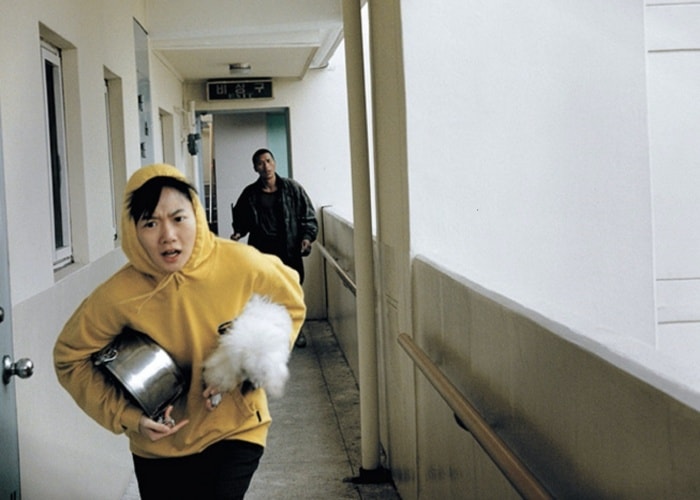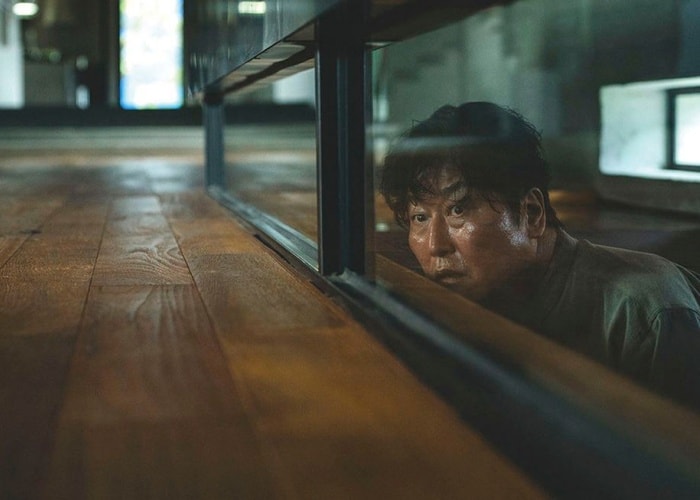After a monumental 2019, what more can really be said about th Cannes-, Golden Globe-, Critics Choice-, Writers Guild-, BAFTA-, Grand Bell-, and three-time (on his first try as a nominee!) Academy Award-winning director Bong Joon-ho? From his art direction to his editing, his actors to his cinematography, we seriously can’t stop, won’t stop praising this auteur and his compelling work.
Why? Because he mixes some of our absolute favorite genres – from black comedy and crime thrillers to science fiction and monster movies – to tell nuanced, multilayered stories on themes ranging from classism and isolation to just how fucking rough it can be making a living in the 21st century. Especially when confronted with gigantic river monsters or a baby crazy Chris Evans.
But in spite of the bleak streak that his filmography can conceivably cut, the true testament to Bong Joon-ho as an artist is that each of his films – no matter how sad, violent, or uncomfortable they might be – are always unbelievably entertaining. And because they’re so enjoyable, you won’t mind gorging yourself on his filmography over the course of 24 hours!
And now that streaming services like Hulu have made it easier than ever to catch up on his earlier work, there’s absolutely no reason not to brush up on your Bong Joon-ho before he announces whatever his next masterpiece will be!
To help get you primed, we’ve curated the perfect Bong Joon-ho movie marathon to give you a complete picture of the cinematic artist behind the best movie of 2019.
Barking Dogs Never Bite

If you want your marathon to begin with a trial by fire, there’s no better place than Bong’s first major film, Barking Dogs Never Bite. What are you to expect? Well, you’ll get plenty of the earliest thematic threads that he will continue to explore in his career, such as the friction between the hierarchies of social status in South Korea. But you’ll also be treated to violent acts of almost-but-not-quite simulated animal abuse, as well as a stomach-churning scene depicting a controversial but historical practice that will make more than a few people turn the film off immediately.
But did I mention it’s also a laugh out loud comedy? Don’t worry about those portrayals of cruelty, there is a point to everything I mentioned (eat the rich, am I right?) and it’s still firmly rooted in the same classist confrontation that typifies Bong’s later career. We are treated to glimpses of the whimsy that is speckled throughout his films, especially in the third act’s magical realism. Even so, Barking Dogs Never Bite is that deep cut that the Bong hive may hate you for recommending. You can blame me.
Stream Barking Dogs Never Bite on Hulu
Memories of Murder

After you’ve made it through Bong’s uncomfortably funny debut, strap yourself in for his aggressively bleak, culturally significant follow-up, Memories of Murder. Not at all unfairly compared to David Fincher’s Zodiac, this is a tension-filled watch with few moments of the levity we come to expect from Bong. It’s almost as if he wanted you to understand the severity of South Korea’s first-ever serial killer, and he does this by not pulling any punches, showing the horror of the spree juxtaposed with the corruption of local law enforcement and their drive to coerce any kind of confession, even from the wrong man.
That specific theme of the ineptitude of authority I found supremely helpful when visiting Bong’s other films, especially Mother, where the fine line between coercion and confession are too often blended. This film is an absolute thrilling watch that you can’t tear your eyes away from, and it features a who’s who of Bong’s future collaborators, like Parasite‘s paterfamilias, Song Kang-ho.
The Host

The Host is about a monster that rises from the depths of the Han River due to the callousness of an American pathologist (Scott Wilson, in a blink and you’ll miss him cameo), and it was a huge crossover hit for Bong upon release. The film was hotly anticipated on the heels of Memories of Murder’s smash success, but where the earlier movie may have been lacking in humor, The Host more than makes up for it with its stark satire on Americanization, the inadequacies of government, and the lengths families will go to in order to stay together.
Its themes of manufactured misinformation and palpable social fears amidst a viral heath scare may hit extremely close to home at this very moment, but it’s done with such unexpected levity that you can take rueful comfort in it. While the region is on edge, worried about a new SARS-like virus connected to the appearance of a mutated fish monster, a crowd of people huddles around a crosswalk waiting for the light to change. A woman draws away as a man begins a hacking cough. Continuing, he removes his mouth and lets loose a long string of saliva into the puddle in front of him. The crowd around him, despite the masks, are clearly disgusted and more than a bit alarmed about his brazen spit. But within the moment, a truck suddenly roars by, splashing the loogie filled water across the crowd as the scene cuts. Now THAT’S comedy during a global pandemic!
Mother

Continuing The Host’s interest in the extremes parents will go to in order to protect their children, Mother is about — you guessed it! — a mom tracking down a killer after her developmentally disabled son is accused of a murder. The titular character, left nameless throughout the film, is played by Kim Hye-ja, affectionately referred to as the national mother of Korea for her years of playing maternal characters on popular soap operas. But whereas Bong’s other films rely on the dynamics between larger families, Mother’s focus, and the brunt of the film’s emotional weight, lies directly on Kim’s shoulders. And damn, does she masterfully bear that weight. She can switch on a dime from sweet and caring to cold and ruthless, nonverbally communicating a violent rage that only mothers can know, while also being able to gracefully dance in an open field.
With her deft skills, it’s no wonder that Bong wrote this role with Kim in mind. As he said in Anthem magazine, “My thought was, ‘Let’s take Korea’s ‘national mother’ and make a really weird movie. I imagined that she must be sick of it, too, playing the same role over and over again. I thought that, if I brought her this story, she would probably enjoy it.” But despite the wistful sorrow that courses through Joon-ho’s films, he still manages to fill them with a sense of hope. If you like the melancholic optimism that Parasite leaves you with, then you’re going to love Mother.
Parasite

So here’s the thing about Parasite: it really is as good as everyone says it is. A story of classism and power with a tone that’ll most likely be emulated over the next decade, what stands out about Parasite as the final film in your marathon is how everything Bong has made before has been leading up to this. The themes he’s explored, the multifaceted characters he’s developed, the tightrope between comedy and tragedy he’s refined, it is all perfectly exemplified in Parasite.
Without leaning on the popularity of monster movies, dystopic forever trains with Captain America (Snowpiercer), or superpigs funded by Netflix (Okja), here Bong takes a uniquely South Korean story and made it a global sensation. Even your grandpa has heard about Parasite and, what’s more, he probably loves it. That’s because when you strip away the allegories, the metaphors, the symbolism, and the social relevance, Bong’s films are still a fucking blast. And that just gets back to my original point. Why do we love the director? Because he’ll always deliver pure, thrilling entertainment.
0 comments:
Post a Comment